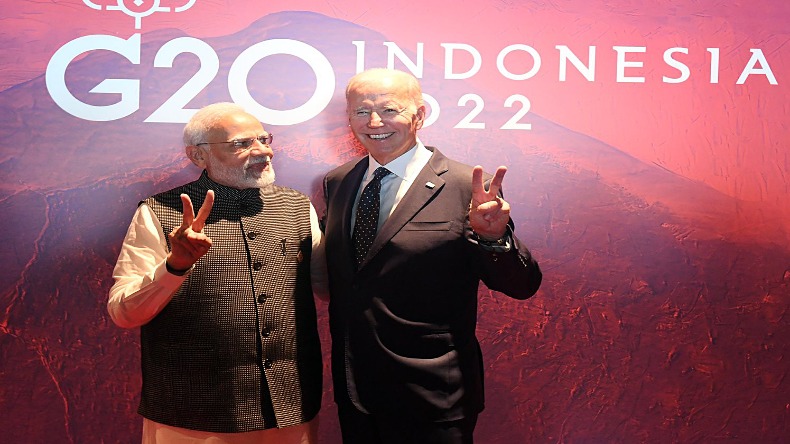Historically, US-India innovation relationship has been about India being outsourced low end services. With iCET, there’s a paradigm shift. India has access to high end technology.
In recent weeks, India-US relationship has been featured prominently in the headlines. Rahul Gandhi’s visit to the United States and outreach to the Indian diaspora have attracted considerable attention. The recent India visit of US Defence Secretary, Lloyd Austin has reinforced the major defence partnership and advanced cooperation in critical domains. India-US military cooperation has moved forward in leaps and bounds even though India is not an alliance partner of the United States. The recently concluded major jet engine deal as well as the Quad partnership are also strong positive developments. The recently joined US Ambassador to India, Eric Garcetti expounded on the “strong and profound relationship” that the two countries share. Moreover, business leaders in the two countries are optimistic about the future of our business collaboration. Finally, the upcoming address to both Houses of the US Congress by Prime Minister Narendra Modi is gaining much excitement. The visit is especially significant as PM Modi is the third world leader to be invited for a state visit by Biden, following French President Emmanuel Macron late last year and South Korean President Yoon Suk Yeol in April. Moreover, Modi is the first Indian PM to address the US Congress twice despite India not having taken sides with the US on the Ukraine issue.
The US-India Initiative on Critical and Emerging Technologies or iCET is a pivotal partnership with importance that only finds parallels going back to the India-US civil nuclear deal. iCET partnership is based on a mutual understanding that emerging tech has the opportunity to impact economies and societies positively. This will occur best through cooperation, collaboration and exchange of knowledge leading to innovation and development. It is expected to result in increased cooperation between industry, academia, and government agencies in both countries on technology areas of semiconductor supply chains, space, and STEM. Additional developments within iCET involve the establishment of the US-India Joint Working Group on Counterterrorism Technology. launch of the US-India Strategic Energy Partnership. formation of the US-India Artificial Intelligence Initiative, establishment of the US-India Joint Clean Energy Research and Development Center and launch of the US-India Innovation Forum. As an extension, it helps develop startups and businesses that work in cutting edge technologies, spur entrepreneurship and help generate employment.
Historically, the US-India innovation relationship has been about India being outsourced low end services. With iCET, there’s a paradigm shift—India has access to high end technology. With this, India’s position as a technology power is emerging, slowly but surely. However, on issues of technology, only collaboration will not suffice. On the American side, they must also give greater access to Indian technology professionals to work in the US and in Silicon Valley. The current visa restrictions on Indians must be relaxed. While on our side, India must spend more on R&D for its technological development as well as support universities by giving them greater freedom and autonomy to pursue their research.
The recent appointment of a task force to explore further expanding research partnerships in higher education between the two countries by the Association of American Universities is a welcome step. The task force has luminaries like Neeli Bendapudi, Robert J. Jones, Pradeep K. Khosla, Satish K. Tripathi, Rajesh K. Gupta and Sunil Kumar from universities like Pennsylvania State University, University of Illinois Urbana-Champaign, University of California San Diego, University at Buffalo and Johns Hopkins University.
The two countries are also intent on collaborating on building resilient supply chains for semiconductor chips that are being disrupted due to geopolitical disruptions. These chips are the beating heart of the global technology industry that form the foundation of all our tech products, making this partnership all the more important. Part of the US friendshoring strategy involves India as a critical partner for its supply chains in the Asia-Pacific. Today, only a few countries are capable of chip-manufacturing from Taiwan, South Korea, Japan, the United States, and China. India is now increasingly part of that small, exclusive group through our capacity building.
India-US partnership is one of the seminal relationships of this century. The key components of this relationship are the innovation bonhomie and education partnership that the two countries are building towards. Embellished in this is the vast diaspora in the US. The Indian diaspora is one of the most affluent communities in the US and is a prime demographic to be wooed for Indian politicians across party lines. As the government and the opposition are united in the outreach, it makes India-US relationship a stable force for times to come. The US is seen by Indians as a strategic partner. On the American side, the diaspora is viewed as a consequential vote bank and donor source for US domestic politics. At the same time, the diaspora must give back more to India than simply its vote of confidence. It is hoped that greater investments, business and wealth creation happen in India through the investments made by members of the diaspora community. This would spur a positive feedback loop of employment generation and knowledge dissemination in India, leading to the diaspora gaining by more members joining it and strengthening the community in the future. Rajesh Mehta is an international affairs expert focussing on areas like market entry, innovation, geopolitics and public policy.

